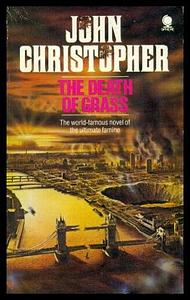Take a photo of a barcode or cover
Short read, depressing survivalist tale of England in a desperate famine. Pulpy.
adventurous
challenging
dark
sad
tense
fast-paced
Plot or Character Driven:
A mix
Strong character development:
Yes
Loveable characters:
Complicated
Diverse cast of characters:
No
Flaws of characters a main focus:
Yes
What would happen to the world in a time of extreme food shortage? John Christophers novel examines what happens to a group of friends as they travel north from London to the family farm in the north and the changes that happen to them (as a metaphor for society) on the way.
The idea that every species of grass is killed by a virus is interesting and the fallout from it is quite well realized. However, this book is most definitely a product of its time. The people in this appear to be fictionalized British people complete with stiff upper lip and dealing with everything "matter of factly" which makes sense in post-war Britain but in the more Americanized and softened Britain of the 21st century I think people would be different.
So the reason I have given this 3 stars rather than more is because I found myself thinking that people wouldn't react like that now a number of times in the novel. Not that this is a fault of the writer, his book isn't going to automatically change as society does. But the rating is a genuine observation of how I felt about it while reading.
The idea that every species of grass is killed by a virus is interesting and the fallout from it is quite well realized. However, this book is most definitely a product of its time. The people in this appear to be fictionalized British people complete with stiff upper lip and dealing with everything "matter of factly" which makes sense in post-war Britain but in the more Americanized and softened Britain of the 21st century I think people would be different.
So the reason I have given this 3 stars rather than more is because I found myself thinking that people wouldn't react like that now a number of times in the novel. Not that this is a fault of the writer, his book isn't going to automatically change as society does. But the rating is a genuine observation of how I felt about it while reading.
This book terrified me! One of the few books that has left a lasting effect on me and still has me thinking about it years after I read it
The world-famous novel of the ultimate famine!
The Death of Grass by John Christopher
My rating: 4 of 5 stars
Essential Must-Read Seemingly Forgotten Dystopian Classic
Blurb: The Death of Grass is an entirely original kind of science-fiction - it is not about space-travel, time-travel, or mechanical men. It recounts the terrifying changes on the face of the earth when the balance of nature is upset - and it takes place not in the future but now.
The characters are middle class people who live serenely until the grass begins to die - upon which their personalities begin imperceptibly to change with the changes that creep over the landscape. The fearful national policies and immediate personal dangers they are faced with are horrible in their impact, and in the dangerous obstacle race for safety (and for life itself) the reader feels himself to be personally and desperately involved.
Thoughts: Recommended to me by the Goodreads recommendations engine during one of the brief periods when it was working, I was initially drawn to the wonderful premise of a simple "what if" science fiction question, namely in this case "what if a virus kills all forms of grass worldwide?" Grass meaning wheat et al not just the wonderful stuff used as a playing surface for tennis, cricket and croquet. It's a premise that would also later go on to form the basis of the brilliant award winning dystopian post-(post?)-cyberpunk thriller The Windup Girl.
But this is very definitely a post-atomic approach towards the genre, with a message that could be picked up by Greenpeace and hippies the world over even today and used as a warning against the way we are destroying our planet. This novel recounts the terrifying changes on the face of the earth when the balance of nature is upset - not at some nebulous date in the future but right now or the now of 1956 at least. Perhaps a re-issue from Al Gore on 200% recycled paper is required?
The story starts off with a global disaster and slowly becomes more and more personal, with a denouement focussing on one barricaded village and a handful of people. The characters are normal people, described in the blurb as middle class, with peaceful lives until the virus begins to take hold and food becomes scarce. In the beginning they make a point of being proud of the British attitude towards hardship, the famous Dunkirk spirit etc, but the predicament slowly changes all of them in irrevocable ways. They must undertake a journey of ever increasing hardships as society falls apart thanks to weak governments (things haven't changed much since 1956 huh?) and the panic of the masses leading to riots (as seen in London just last year but with the desire for new shoes and TVs replaced by a need for food.) And as a reader you can't help but take the journey alongside them thanks to the quality of the writing. Sure it's easy to judge these people for the decisions they make but there's a power at work in Christopher's writing that puts you in the band of survivors and suddenly it's harder to disagree with the man leading you to safety.
I'm not sure how much it actually helped me to enjoy the book but Brief Encounter is one of my favourite movies of all time, being able to imagine Trevor Howard and Celia Johnson as the protagonist Johnny and his wife Ann was an excellent bonus, even if just as a way to understand the speech patterns peculiar to the British middle classes of the era.
It's easy to imagine the stark landscape shorn of all grass, not least because of the volume of post-apocalyptic movies that have been released in recent years. The Book of Eli has an overall colour tone perfectly suited to a grass-free planet but features human attrocities in explicit detail, something Christopher only hints at in this book. It's much better for that too, bad things happen but the prose only really "arrives" in the aftermath and studies the reactions of these ordinary decent people to extraordinary events.
I'm left thinking about The Road and how bleak it was, John Christpher comes close but without being so overt and rubbing your well-fed, happy face in to it. In comparison you don't need to feel bad for being content and living a peaceful existence after putting this book down.
Powerful, thought provoking stuff, despite its content a highly enjoyable read and at under 200 pages not bloated, not rushed but perfectly paced. I give this book my highest recommendation. And shall finish with a transcription from the blurb on the front of my beautiful 1st edition Penguin:
An unusual and absorbing piece of science-fiction about the relentless transformation of England when the balance of nature is upset.
'The Death of Grass sticks with commendable perserverance to the surface of the earth we know...John Christopher has constructed an unusually dramatic and exciting tale.' DAILY MAIL
Originally posted at blahblahblahgay
dark
sad
fast-paced
Plot or Character Driven:
Plot
Strong character development:
No
Loveable characters:
No
Diverse cast of characters:
No
Flaws of characters a main focus:
Yes
Man, I hated this book. I’m giving 3 stares because the writing was pretty good and the story idea was interesting. Other than that, not much redeeming about this book and especially the main characters. Did not like them at all, especially John, one of the most despicable characters out there. These people went to abandoning and killing people so quick while supposedly being the ones to “root for”
challenging
dark
fast-paced
Plot or Character Driven:
Character
Strong character development:
Complicated
Loveable characters:
No
Diverse cast of characters:
No
Flaws of characters a main focus:
Yes
This was a really hard book to review, in the end I chose this score as a settlement between some aspects that I liked and others I really hated.
The good is that it is a compelling story, with a premise that most people will be able to draw parallels from with reality. There are some good action chapters and the book doesn't overstay its welcome.
That said - the bad is that this story has such a disgusting view of human nature, it is hard to see some chapters as anything but hateful - particularly with the way women are used and portrayed in the story. It would also be *very* kind to describe the beginning of the book as "of it's time" with its use of language towards Chinese people. The book also goes beyond well beyond the "how power corrupts a person" trope and basically ends up concluding "not only does it corrupt, but its kinda good and necessary that it does?"
The good is that it is a compelling story, with a premise that most people will be able to draw parallels from with reality. There are some good action chapters and the book doesn't overstay its welcome.
That said - the bad is that this story has such a disgusting view of human nature, it is hard to see some chapters as anything but hateful - particularly with the way women are used and portrayed in the story. It would also be *very* kind to describe the beginning of the book as "of it's time" with its use of language towards Chinese people. The book also goes beyond well beyond the "how power corrupts a person" trope and basically ends up concluding "not only does it corrupt, but its kinda good and necessary that it does?"
Graphic: Rape, Violence
adventurous
dark
tense
medium-paced
Plot or Character Driven:
A mix
Strong character development:
Yes
Loveable characters:
Complicated
Diverse cast of characters:
Complicated
Lord of the Flies for grownups. A brutal, gripping, and worryingly prescient read.
This book was a fine example of post-apocalyptic literature. The premise seemed original and despite the plot being given away in the synopsis, still unfolds beautifully. It offers some fantastic chances for insight into human psychology in a time of crisis and there were some brilliant role-reversals throughout, constantly kept the reader guessing as to whether they would find salvation, and more importantly who would still be left to find salvation. The ending was surprising, in one way or another and the family narrative that framed the novel formed a really lovely cohesive device the entire way through. I could quite easily have given this 5 stars but to my own taste it was a little brief. Otherwise left the reader asking all the right questions, undoubtedly the sign of a great post-apocalyptic novel.





